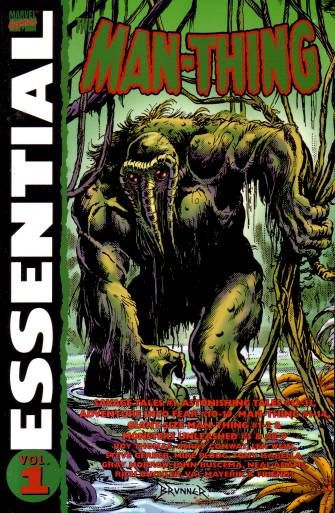
Essential Man-Thing Vol. 1
Steve Gerber, Roy Thomas, Val Mayerik, Mike Ploog and Friends
Reprints: see below
Get this for: Gerber, Gerber, Gerber! — five stars
Right. Day two. Essential Man-Thing Vol 1 collects Savage Tales #1, Astonishing Tales #12-13, Adventure into Fear #10-19, Man-Thing #1-14, Giant-Size Man-Thing #1-2 (don’t snigger) and Monsters Unleashed #5, #8-9. It features writing and art of Roy Thomas, Gerry Conway, Tony Isabella, Mike Ploog, Val Mayerik, Gray Morrow and others, but is dominated by one man: Steve Gerber.
Man-Thing made his debut in May 1971, only two months before that other muck encrusted swamp monster, Swamp Thing over at the Distinguished Competition, more a case of tapping into the same zeitgeist as somebody copying somebody else. Whereas old Swampy still had a human intelligence under all that muck, Manny was less fortunate, with the man he was, Ted Sallis, yet another genius-scientist who became the victim of his own weapons, completely submerged, leaving him to react purely by instinct. In the first few stories this leaves Man-Thing to function as a deus ex machina, to pop up at convenient times to drive the plot. Once Gerber takes over the writing this role doesn’t change much.
The real difference is what kind of stories Gerber has Man-Thing resolve. He mixes in horror, absurdity, superheroes and a generous helping of seventies politics and soulsearching. At its worst this becomes an incoherent mess, but at its best this made Man-Thing one of the best things Marvel had during the seventies, something that was genuinely in touch with the times. This was of course also the series that introduced Howard the Duck to a largely befuddled world and you can see part of what Gerber would perfect with Howard already here.
With Man-Thing, what you have are stories that are only slightly more absurd than what you’d get in a normal Marvel series, with villains who are largely buffoons: a corrupt businessman called F. A. Schist (subtle Gerber ain’t), a Cult worshipping Entropy, a Suicided clown replaying his life using Manny and co as his puppets and so on. They’re not that different from the fools you’d see fighting Spider-Man or the Fantastic Four elsewhere, just slightly more amplified. With Manny himself a mute, mindless observer of what’s going on in his own book, only reacting to what people are doing to him, it’s the normal people in his supporting cast who are the real protagonists, especially one Rich Rory, somebody Gerber would uses elsewhere as well.
Absurdity in superhero comics has a bad reputation, because most writers just go for mindless parody. With Man-Thing, you have the absurd (having a warrior prince from another dimension metamorphose out of a peanut butter jar for example) dealt with matter of factly, without the wink-wink nudge-nudge of lesser titles…
Most of the artwork in this volume is by Val Mayerik, somebody I’ve always liked. Unfortunately the lack of colour seems to have zapped some of the vitality of his art here; it all looks a bit pedestrian. But then Mike Ploog takes over and his slightly cartoony yet slick style works quite well in black and white. There’s some great work by other artists as well, including John Buscema and Gray Morrow.
